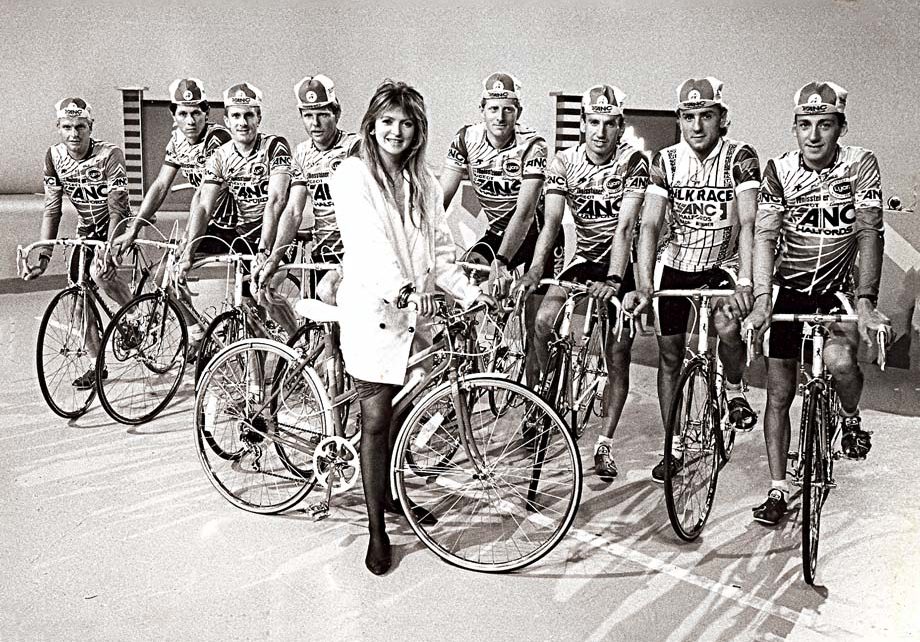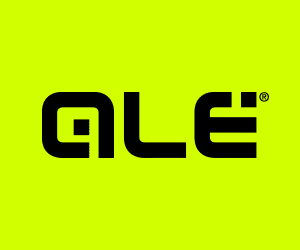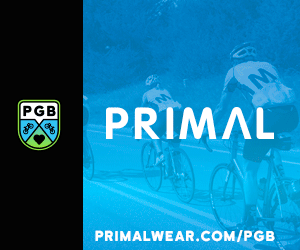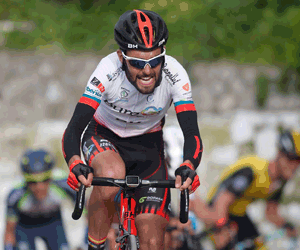Rider Interview: After talking to Nathan Dahlberg recently, Ed Hood got to thinking of other top riders from New Zealand, and of course the name Stephen Swart immediately came to mind. Swart told the truth about Lance Armstrong when it wasn’t fashionable, but he also had a successful career before the LA controversy.
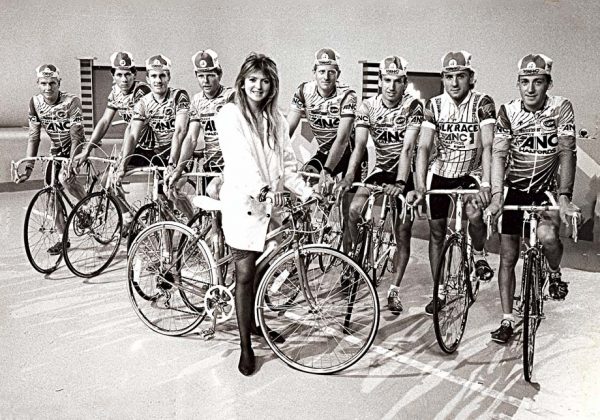
The ANC Tour team on the BBC children’s program Blue Peter
The man was there: On that legendary 1987 ANC Team Tour de France adventure: Kiwi, Steve Swart. But that’s just one facet of his story; many will also know him as one of the first people to tell the truth about the modus operandi of a certain former seven time non-winner of the Tour de France. Then ride the whirlwind of denials emanating from Texas.
PEZ: A silver medal in the 1986 Commonwealth Games team pursuit, did you ever consider pursuing a track rather than road career, Steve?
Stephen Swart: Most New Zealand riders grew up doing both, the track in summer, the road in winter that was all we knew. I was good at both, the only real chance to get to the ‘86 Games was on the track, so that’s how I ended up there. I spent six weeks at the beginning of the season in Italy riding for a team based in Vicenza, then six weeks at C.S.M Persan BIC in Paris prior to meeting the NZ national squad in Indianapolis to prepare for the Commonwealth Games.
PEZ: The year 1987 and New Zealand to England; even further then than it is now. . .
That’s true, but at the destination I was going to there was a team waiting which I was going to ride for; not as daunting as packing your gear and heading off to Europe and trying to stamp your mark.
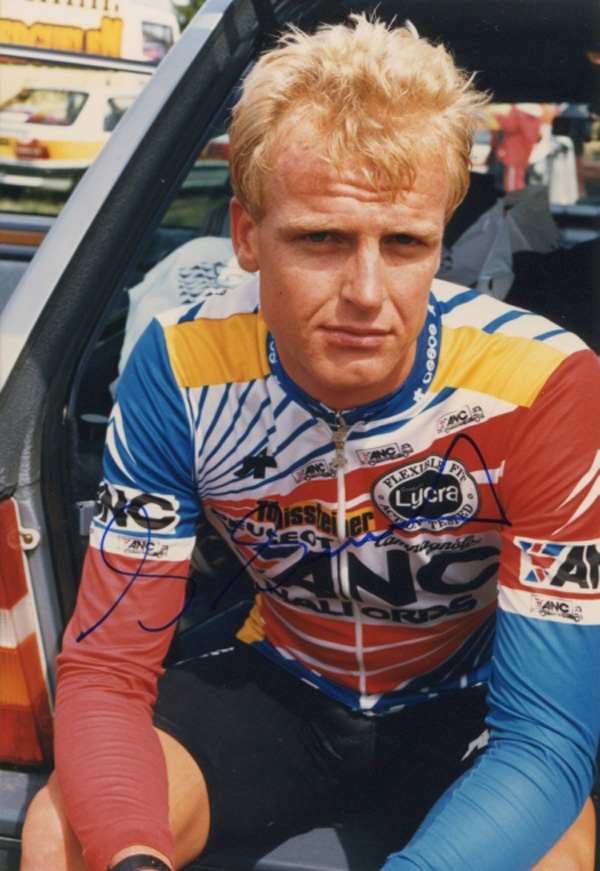
PEZ: How did the ANC ride come about?
Vern Hanaray a retired Kiwi rider was living in the UK and was a friend of Phil Griffiths who managed ANC-Halfords. Ron Cheatley NZ road coach prepared the road team prior to the Commonwealth Games in ‘86 by us racing in England; he was a good friend of Vern’s. Brian Fowler was a super-talented rider on the road team who showed his class prior to the Games and between Ron and Vern they got him in front of Phil to join ANC for ‘87. Brian declined and at the end of Tour New Zealand in November when Vern was in NZ visiting, Ron pushed my ability to Vern who pushed me to Phil which Tony Capper agreed to.
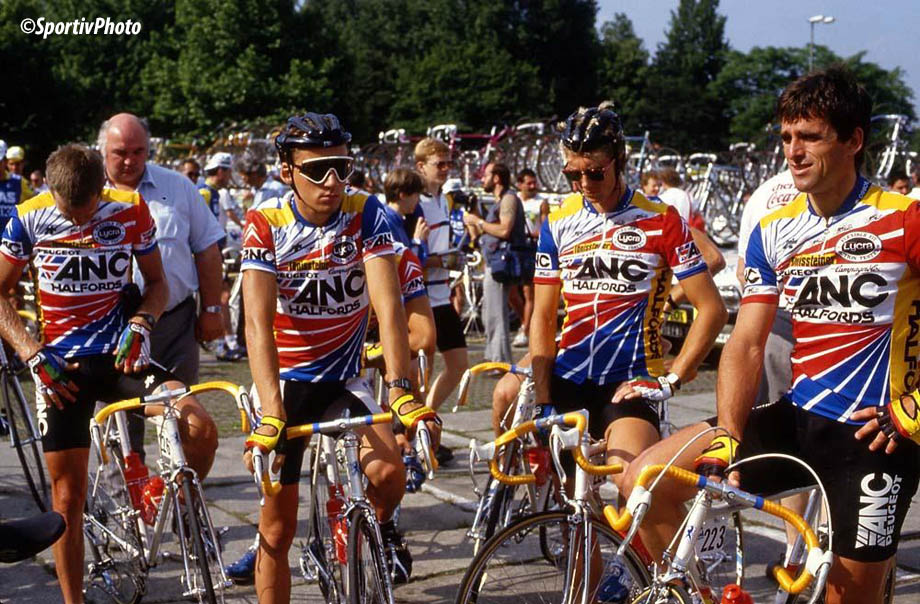
PEZ: Your memories of that ’87 Tour – you were so near to finishing but. . .
I rode a super Milk Race in support of Malcolm Elliot and still managed a high GC place myself; that was where my good form left me. But the Tour; the whole thing was just the next level – the speed, crowds, everything. During the Prologue in East Berlin I got stung by a wasp on my inner left thigh, my leg blew up but still managed to carry on, so I had that issue and a lack of form. Then I started having problems with the ball of my foot, I tried all sorts of ideas but finished each day in a lot of pain; however the fatigue from racing was way worse. The day after the individual time trial up the Ventoux we went into the Alps and the first real acceleration there was ‘nobody home’ – I think if someone had breathed on me I would have fallen off I was so wasted. That was the 18th stage and still with three hard days in the Alps, I’d given it everything.
Tour’87 in Berlin with ANC
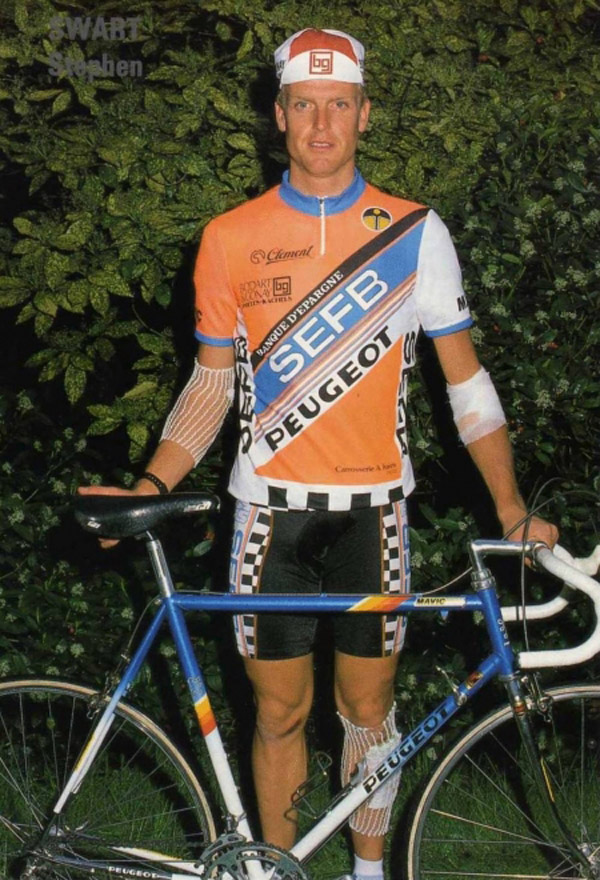
PEZ: In ’88 you rode for SEFB; tell us how you got that ride and what was the team like?
The Belgium director from ANC-Halfords, Ward Wouters, took a liking to me and ‘Omar’ Palov, an ex-Czechoslovakian come Aussie. He kept an eye out for us during the winter of 87-88 and I got a call from him late January ‘88 that he’d found a spot for me and ‘Omar’ in this team SEFB. SEFB was a smaller domestic Belgium team from Liege, we generally did the smaller races, with some semi-classics; the only major classic we started was Liege-Bastogne-Liege. That year there was a big crash after Bastogne going down a straight road. I was fourth or fifth row from the front. A trench had been dug across the road and not compacted fully which left a lip; the first few riders could see it and jumped but the row in front of me fell and we just all started falling like dominos. I slide down the road so far that the buckles on my right shoe were sanded off. The other director on the team was Ferdinard Bracke; come the Route du Sud and Tour de Swiss I was riding best of the team and he took a liking to me, giving me advice. But my mother was sick with cancer before I left to Belgium, I got news she only had a few weeks left so I asked if I could go home; their reply was; ‘don’t bother coming back.’
PEZ: Season 1989 – three teams against your name Suntour, Spago and ADR – why go to the USA?
I rode the 1988 Sun Tour in Australia with Alan Peiper and won a couple of stages; Alan tried to get me a position with Panasonic but it didn’t happen, so I didn’t really have anywhere to go to. I wasn’t interested in Belgian kermis racing for not a lot of reward against guys you’d never heard of and who were riding like 10 men. I heard the scene in the US could be quite lucrative so decided to give it a go. Suntour was a local Los Angeles team which took me to races around the southern state; that got me started. Then Spago which was a little bit bigger; I did some bigger rides with them like the Redlands stage race where I ended up third overall against the big teams; 7-eleven and Coors Light. They took me to CoreStates race in Philly where I ended up in the final break, finishing reasonably well. Not long after CoreStates, Coors/ADR had a position open up and asked if I’d join, that finally gave me a salary; things became less stressful and I finished the season with them.
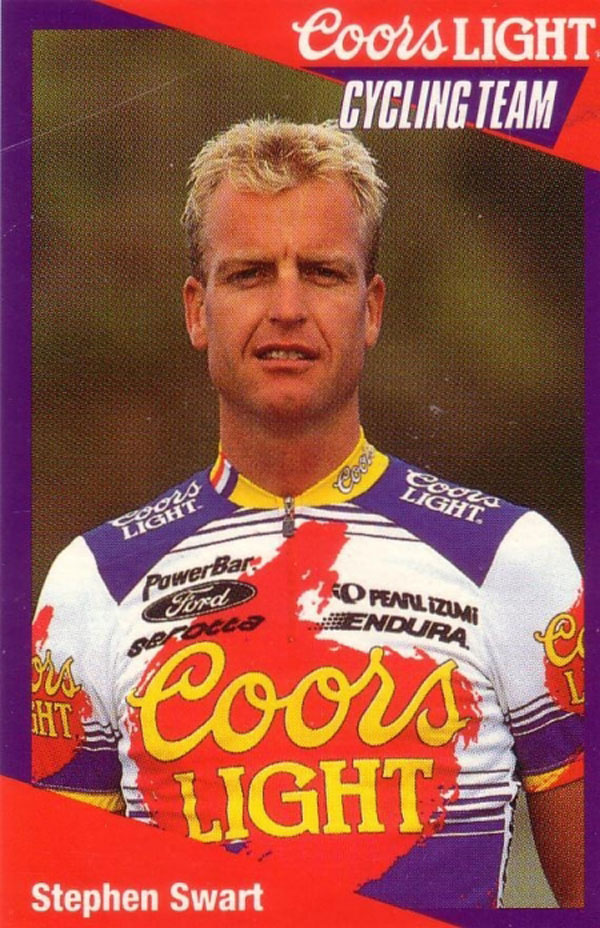
PEZ: How did you get the Coors ride in ’90 – tell us about the team?
It carried on from ‘89. I moved to Boulder where some of the guys lived and learned to ride at altitude and climb the big passes. Coors had riders who specialised in criteriums and others in stage racing. I was versatile enough to bounce between the two. The majority of the racing generally was either on west or east coast so being based in Boulder made it easier for travelling. I had a great time there with Len Pettyjohn the owner of Coors Light, but my results that year were discouraging due to a reoccurring virus. I managed to get the team a start in Tour of New Zealand at the end of the season, which I won, with Greg Oravetz second. After it I took them up north for a bit of vacation time.
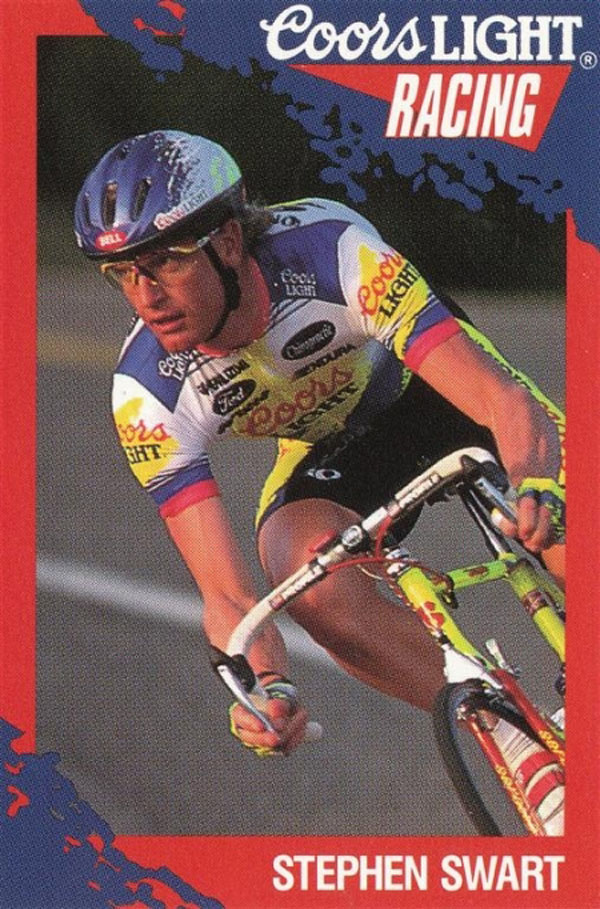
PEZ: You had a lot of nice results in the US, was third in the Dupont Tour the one which gives most satisfaction?
The winter of ‘92 I stayed in Boulder and learnt to cross country ski at 3000 meters, I did a lot of physical work away from the bike and then slowly started incorporating on the bike work. During training camp in Santa Rosa I could tell I was in great shape and it kept rolling from there. DuPont was the first early season goal. I had the leader’s jersey for a couple of days, but I didn’t have the racing kilometres in my legs; Greg Lemond and Atle Kvalsvoll were just stronger. The other result that stands out was winning the US criterium championships.
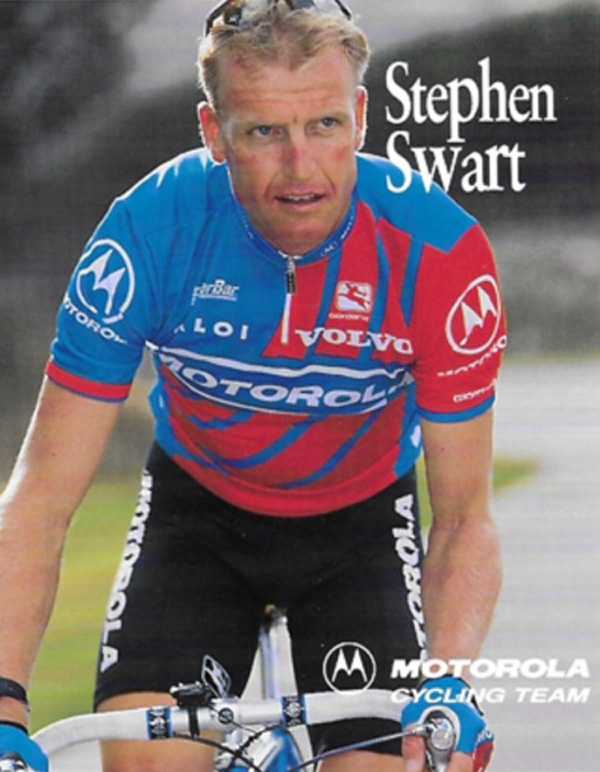
PEZ: How did the Motorola ride came about?
I think in the big races that count I had a presence; not only how I raced but how I went about my business. Towards the end of ‘93 I felt the need to try and see if I could make it back into the Euro scene as I wasn’t getting any younger. I wrote to Jim Ochowicz and received a call just after the Worlds, which Lance won, that they’d take me on.
PEZ: The ’94 Tour how did it compare to the ’87 race for you – what are your recollections?
Night and day; ‘94 I was in a better team structure even though I had some shaky moments getting sick in Pyrenees, not being able to eat anything for couple of days and living on glucose supplement made it touch and go, but after that I came good and finished the Tour strong. The racing speed itself wasn’t a problem it’s more the way they approached the climbs, it was like a drag race to the bottom then they went even faster – just unbelievable.
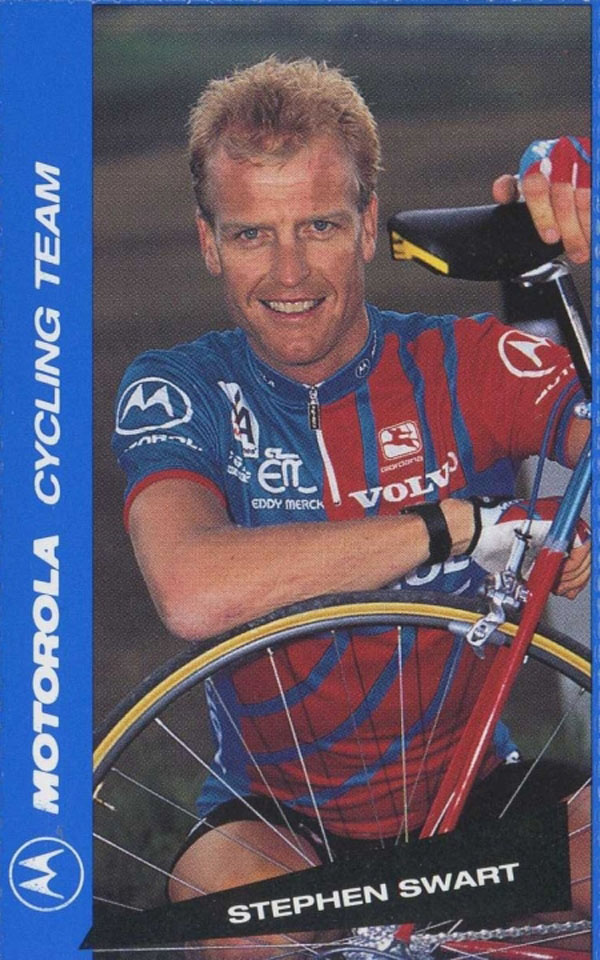
PEZ: The team lost the Tour TTT by six seconds, that must have been sore?
Yeah. We spent the week before the start in training camp riding the circuit trying to know everything about it. The day before I was in a long breakaway with Jacky Durand which cost me a little strength but I did as much as I could ‘til I popped towards the finish. I don’t think that caused our loss though, there were one or two swinging right from the start.
Tour’94 stage TTT
PEZ: You did a nice ride in the Tour of Luxembourg in ’95.
After the classics I did a stint back in the States to recharge. I came back to Europe and the condition was definitely coming along nicely heading to TDF. But that’s the year we got involved with EPO trying to catch up with the teams who were miles ahead. When I finally did start a course of it during racing it dragged me down big time. I soon realised that it robs you of energy in the beginning as your body is in full production mode and would have been better to undertake it in a recovery period. I can only blame our doctor at the time for not knowing enough about it all.
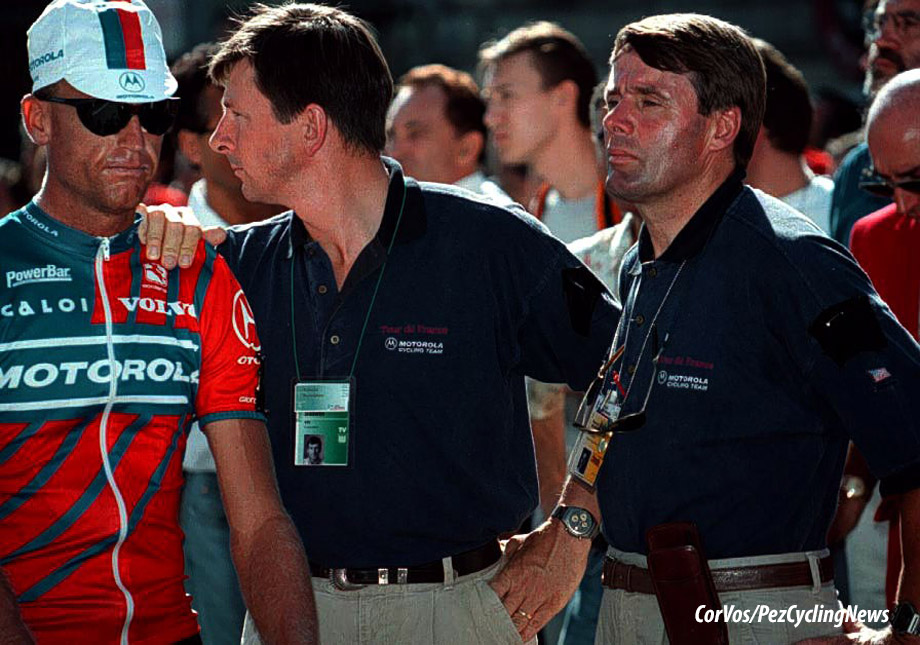
PEZ: Your third Tour in ’95 – memories of that one?
It started off okay then turned to shit. We were just riding, but not being able to participate; then there was the accident and death of Fabio Casartelli – it was nice to reach Paris.
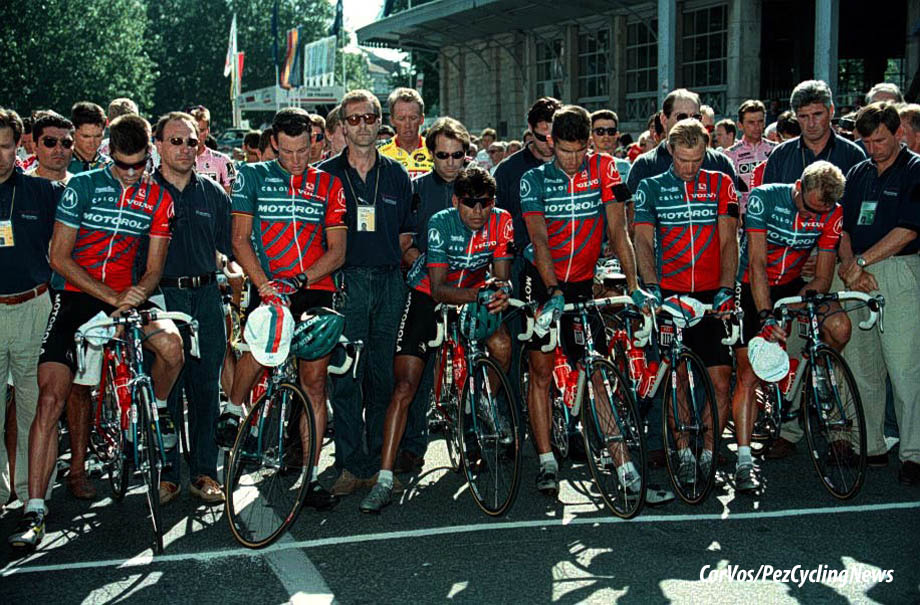
PEZ: Why quit after ’95?
My contract wasn’t renewed for ‘95 and I never pursued any other teams. The mid 90s is well documented for all the shit that was going on. They’ll be people out there who say; ‘that’s not true,’ but the peloton is a small community and you hear what this and that guy are doing. I know just what EPO will do; once it did raise my haematocrit values I became competitive and my recovery was unbelievable. But that was leading down a long dark road which I really didn’t want to venture down. I’d always told myself if I hadn’t made it by 30 time to move on.
PEZ: What did you do after you quit?
I started an Automotive business, built that up then sold it – it wasn’t really what I wanted to do. Then I got involved in construction, spec build, redevelopment, renovation etc. then a waterproofing business that’s been pretty good to me. I’m now in polymer engineering; always looking for a challenge.
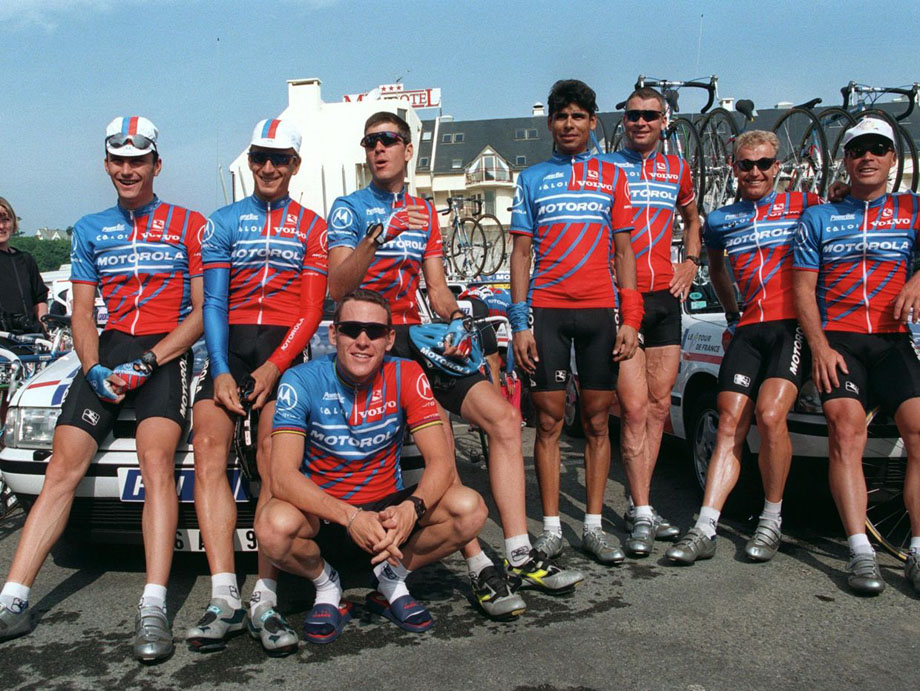
PEZ: The Lance revelations – that must have been a difficult time for you?
No doubt. I didn’t just last for 12 months, it went on for years. I soon learned who my friends were; there are a lot of back stabbers out there.
PEZ: Did Lance ever catch up with you on his visit to New Zealand?
No, he had no intention; when you read somewhere he made amends with someone it’s because it gets him good press which improves his status. You can’t change a leopard’s spots.
PEZ: You were, ‘New Zealander of the year in 2012’ – that must have been pleasing?
Maybe they were short on candidates? They all come at you; ‘congratulations, you must feel vindicated, blah blah.’ My only motive for speaking up was to gain change because the sport that gave me so much was sick. Verbruggen was corrupt. The ones coming through needed to know what they’re going to face as this was the one area that wasn’t documented. Everybody had access to training methods, coaches and good equipment but the one thing top secret was the medical side of things. I’ve never campaigned for guys not to take this or that; just as long as they had all the information to make an informed choice. But yeah, the recognition is welcomed.
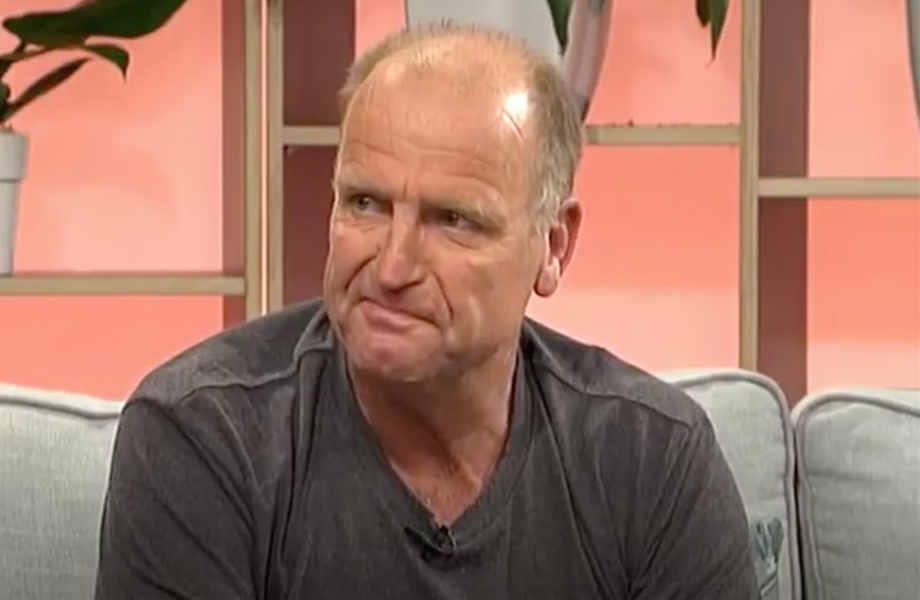
PEZ: Are you still doing your Enviroplaz thing where you recycle waste plastic?
Yes, there are two sides to this business. One is manufacturing lightweight products out of HDPE (high density polyethylene) for a variety of projects. The other is that we’ve develop a lightweight aggregate from plastic waste to incorporate into concrete with huge advantages in weight and flexibility. This has gained a lot of momentum these past 24 months with a lot of places scrambling about what to do with their plastic waste – so fingers crossed.
PEZ: Do you still follow the sport.
I do, but I don’t like the radios and power meters; it’s made for clinical and boring stage racing. But not the Classics and Worlds; they still decide who’s best on the day.
PEZ: With hindsight?
You could say I should never have lined up for the ‘87 Tour. There were lessons learned there which set in motion other events which subsequently jeopardised my path forward.
Inspirational Stories: The Cafe chat to Cycling Legend Stephen Swart
